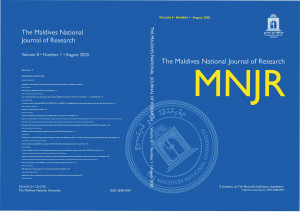Abstract
Community Based Tourism (CBT) has bloomed in the Maldives in the past decade. However, islanders have yet to explore CBT. The purpose of this study is to explore the challenges in initiating CBT in Thaa Guraidhoo. In the Maldives, CBT is identified as “Local Island Tourism” (LIT), where guesthouses are run by families. For the year 2019, state 40% of all guesthouses are in Kaafu atoll. There are only 3 guesthouses in Thaa Atoll alone, indicating that there has been a lack of participation in CBT. Maldives is a country that focuses on selling its sun, sand, and sea (Ministry of Tourism Arts & Culture, 2012). However, with the country becoming more open to the idea of CBT, a study in this field is required. An exploratory research was conducted by collecting qualitative data through purposive sampling via interviews. An inductive approach, to some extent theory-driven, has been taken for the study. Four major factors were identified as challenges in CBT initiation. The study highlights a need for land use planning, a monitoring framework for tourism development and, public transport systems.
References
Ahmed, M. (2018). Guesthouses in the Maldives: Towards community-based tourism. International Journal of Innovation and Economic Development, 4(1), 44-50.
Álvarez-García, J., Durán-Sánchez, A., & Río-Rama, M. d. (2018). Scientific coverage in community-based tourism: Sustainable tourism and strategy for social development. Sustainability, 10(1158), 1-18.
Asker, S., Boronyak, L., Carrard, N., & Paddon, M. (2010). Effective community based tourism: A best practice manual. Sydney: Sustainable Tourism Cooperative Research Centre.
Blackstock, K. (2005). A critical look at community. Community evelopment Journal, 40(1), 39-49.
Dodds, R., Ali, A., & Galaski, K. (2018). Mobilising knowledge: Determining key elements for success and pitfalls in developing Community Based Tourism. Current Issues in Tourism, 21(13), 1547-1568.
Ernawati, N. M., Sanders, D., & Dowling, R. (2017). Host-guest orientations of community-based tourism products: A case study in Bali, Indonesia. International Journal of Tourism Research, 19, 367-382.
Fathi, H., Wang, J. H., & Song, H. J. (2018). A study on strategies for local tourism development in Morocco from the perspective of community-based tourism: The case study of Chefchaoun. Hotel Management Studies, 21-36.
Jamal, M. (2007). Exploring tourism development on uninhabited islands. New York: Rochester Institute of Technology.
Kala, D., & Bagri, S. C. (2018). Barriers to local community participation in tourism development: Evidence from mountainous state Uttarakhand, India. Tourism (13327461), 66(3), 318-333.
Karacaoglu, S., & Birdir, K. (2017). Success factors of community based tourism (CBT) perceived by local peoples: The case of Misia project. International Rural Tourism and Development Journal, 53-61.
Kim, S., Park, E., & Phandanouvong, T. (2014). Barriers to local residents’ participation in community based tourism: Lessons from Houay Kaeng Village in Laos. 4th International Conference on Tourism Research (4ICTR), 12, 1-8.
Kunjuraman, V., & Hussin, R. (2017). Challenges of community-based homestay programme in Sabah, Malaysia: Hopeful or hopeless? Tourism Management Perspectives, 21, 1-9.
Ministry of National Planning, Housing and Infrastructure. (2021, June 14). Planning. Retrieved from Ministry of National Planning, Housing and Infrastructure Website: https://planning.gov.mv/planning
Ministry of Tourism. (2019). Tourism Yearbook 2020. Male’ City: Ministry of Tourism.
Ministry of Tourism Arts & Culture. (2012). Fourth Tourism Master Plan 2012 - 2017, Volume 2: Background analysis. Male’: Ministry of Tourism Arts & Culture.
National Bureau of Statistics. (2018). Statistical Yearbook of Maldives 2018. Male’ City: National Bureau of Statistics.
Nitikasetsoontorn, S. (2015). The success factors of community-based tourism in Thailand. NIDA Development Journal, 25-57.
Saufi, A., O’Brien, D., & Wilkins, H. (2014). Inhibitors to host community participation in sustainable tourism development in developing countries. Journal of Sustainable Tourism, 22(5), 801-820.
Tamir, M. (2015). Challenges and opportunities of community based tourism development in Awi Zone: A case study in Guagusa and Banja Woredas, Ethiopia. Journal of Tourism, Hospitality and Sports, 11, 50-78.
Tosun, C. (2000). Limits to community participation in the tourism development process in developing countries. Tourism Management, 21, 613-63
